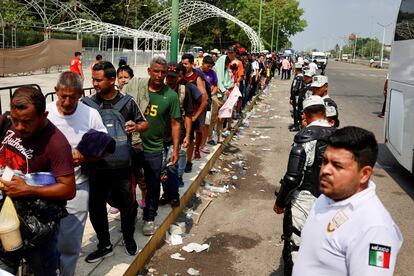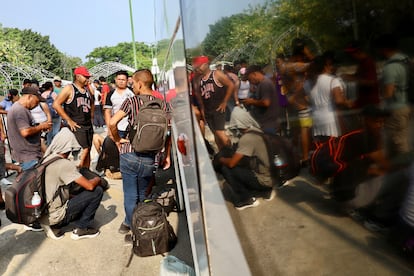‘I’m afraid of being tricked’: Mexico disperses migrants at southern border as Title 42 ends
The National Institute of Migration has closed its emergency office in Tapachula and stopped issuing transit permits as the U.S. warns illegal entry will be met with deportation

One day after the expiry of Title 42, a health directive introduced by the Donald Trump administration during the Covid-19 pandemic but that also allowed U.S. authorities to expel would-be migrants as soon as they set foot on American soil, the ramifications are being felt on the other side of the border. The Mexican government’s additional efforts to attend to migrants entering through the country’s southern border have also come to an end. Faced with the increased flow of people, the National Institute of Migration (INM) set up a temporary headquarters three months ago in a park in Tapachula, a city beset by the massive numbers of migrants crossing from Guatemala. To address the migratory crisis, over the last few weeks the INM pushed through the issuance of thousands of temporary permits to permit onward travel to the north of Mexico and the U.S. border. On Friday, however, nearly 1,000 people waiting in line for their provisional documents found the office had been shut down. Instead of being given papers, INM agents put them on around 20 buses to distribute them to immigration offices in the state of Chiapas, which borders Guatemala in the east.
The INM had promised to deliver the necessary documentation at the other centers to which the migrants were moved. However, on Friday the agency issued a communiqué stating that it had stopped issuing temporary permits, citing a lack of resources. In this climate of contradictions and uncertainty, civil society organizations have warned the INM is now issuing documents in an “arbitrary” manner, and the paperwork does not specify through which border their bearers can leave, leaving them in a limbo that places them in danger. Meanwhile, the United States said they will be deported if they cross its border illegally.
In Tapachula, the city-trap that hosts tens of thousands of migrants, was calm when dawn broke on Friday. The shelters, streets, and squares of the city, which are usually packed with migrants, were relieved. Over the past two weeks, thousands of people had queued in front of the INM’s temporary headquarters in the city’s Ecological Park to receive a permit to travel north. The backlog became so large that the system collapsed, leaving many people to wait fruitlessly for the opportunity to obtain their papers.

Among those loaded onto the INM buses were migrants who had traveled from other continents. Obad Kan, an Afghan traveling with a group of five friends, asked, disoriented and mixing English, Afghan and Spanish, what was happening. Aided by a translation app on his cell phone, he told EL PAÍS he was afraid he would be deported after getting on. “We are tired and we don’t have any money. I am afraid of being cheated.”
The Jesús El Buen Pastor, a shelter with room for 500 people but which is almost always at 300% of its capacity, was at 90% on Friday, according to its manager. However, this by no means indicates that there are no longer any migrants in Tapachula. Local NGOs estimate that more than 30,000 remain stuck in the city. U.S. Customs and Border Protection Commissioner Troy Miller said in an official statement after Title 42 expired that “the border is not open to irregular migration, " and warned that migrants who cross into the U.S. at unauthorized points “may be transported away from Mexico’s northern border to locations in southern Mexico.”
In the meantime, hundreds of migrants continue to cross Mexico’s southern border each day in the hopes of reaching the United States. Local activists say the crisis will worsen further when the deportations of the thousands of migrants now piling up in the south begin.
Late on Friday afternoon, a group of 11 Venezuelans arrived at the Jesús El Buen Pastor shelter. One of them, Josué, said they arrived at the INM office after it had closed and the buses had already left. “They told us to come back on Monday. If they don’t give us the documentation, we are going to continue ahead without papers,” he said.
Sign up for our weekly newsletter to get more English-language news coverage from EL PAÍS USA Edition
Tu suscripción se está usando en otro dispositivo
¿Quieres añadir otro usuario a tu suscripción?
Si continúas leyendo en este dispositivo, no se podrá leer en el otro.
FlechaTu suscripción se está usando en otro dispositivo y solo puedes acceder a EL PAÍS desde un dispositivo a la vez.
Si quieres compartir tu cuenta, cambia tu suscripción a la modalidad Premium, así podrás añadir otro usuario. Cada uno accederá con su propia cuenta de email, lo que os permitirá personalizar vuestra experiencia en EL PAÍS.
¿Tienes una suscripción de empresa? Accede aquí para contratar más cuentas.
En el caso de no saber quién está usando tu cuenta, te recomendamos cambiar tu contraseña aquí.
Si decides continuar compartiendo tu cuenta, este mensaje se mostrará en tu dispositivo y en el de la otra persona que está usando tu cuenta de forma indefinida, afectando a tu experiencia de lectura. Puedes consultar aquí los términos y condiciones de la suscripción digital.








































